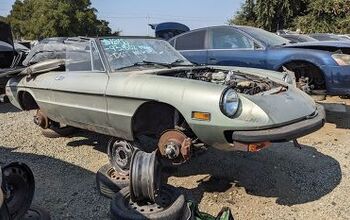UAW Could Soon Tell You to 'Buy American,' But Will Buyers Listen?

Before the end of the 1980s, disenchanted drivers were voting with their wallets in ever greater numbers. Family sedan buyers, burned by the quality control issues of the late 1970s, turned their attention to the Toyota Camry and Honda Accord, while German automakers increasingly carved off a larger slice of the premium segment pie.
In many cases, the buyers who turned their backs on domestic vehicles stayed in their new camp for years, buying another, and then another Japanese or German car. Luring them back remains a difficult task, as stigma often fades at a slower rate than quality improves.
“Buy American” campaigns are nothing new, but President Donald Trump’s ascent to the Oval Office has spurred a newfound focus on the health of the Detroit Three automakers. In a bid to bolster that health, the United Auto Workers union is on the verge of telling you to drive past all those import dealers.
Come home to America.
Yesterday, UAW president Dennis Williams said his union is considering taking out ads to capitalize on the resurgence of “Buy American” attitudes, The Detroit News reports.
“We’re seeing a trend in this country that boycott may be coming back,” Williams said, adding that the public’s buying decisions could help manufacturing businesses invest — or relocate — to the U.S. While he hasn’t yet met with Trump, Williams is pleased the president opted “to scrap” the Trans-Pacific Partnership.
Last November, Williams pushed for a renegotiation of the North American Free Trade Agreement — another wish that will soon be granted.
While “Buy American” sounds nice, two and a half decades of NAFTA means all vehicles sold in the U.S. have varying amounts of parts built in other countries. Some domestic vehicles start life in a Mexican factory, while buyers can snag a Toyota, Subaru or Volkswagen built in the U.S. At best, new car shoppers can only buy “Mostly American.”
“First and foremost, I want them to buy union vehicles,” Williams said when asked to clarify his stance on the now-murky slogan. “Secondary, I’d rather have them buy made in U.S.A.”
Should the UAW go forward with its ad campaign, measuring its success won’t be easy. As always, the onus is on domestic automakers to lure new customers to the brand — not an easy task when dealing with a (mainly) automotive-illiterate society. The Detroit Three can improve its products all it wants, but there will always be a large crop of potential buyers who grimly recall a lemon they owned 30 years ago.
In a study of 2016 car buyers, IHS Markit discovered GM enjoyed the highest rate of manufacturer loyalty, with the highest percentage of repeat buyers in the industry. Ford ranked highest in brand loyalty. Holding on to repeat buyers is important, but overall health and long-term sustainability comes from attracting new ones. In that camp, Jeep poached the most buyers from other brands.

More by Steph Willems
Latest Car Reviews
Read moreLatest Product Reviews
Read moreRecent Comments
- ToolGuy First picture: I realize that opinions vary on the height of modern trucks, but that entry door on the building is 80 inches tall and hits just below the headlights. Does anyone really believe this is reasonable?Second picture: I do not believe that is a good parking spot to be able to access the bed storage. More specifically, how do you plan to unload topsoil with the truck parked like that? Maybe you kids are taller than me.
- ToolGuy The other day I attempted to check the engine oil in one of my old embarrassing vehicles and I guess the red shop towel I used wasn't genuine Snap-on (lots of counterfeits floating around) plus my driveway isn't completely level and long story short, the engine seized 3 minutes later.No more used cars for me, and nothing but dealer service from here on in (the journalists were right).
- Doughboy Wow, Merc knocks it out of the park with their naming convention… again. /s
- Doughboy I’ve seen car bras before, but never car beards. ZZ Top would be proud.
- Bkojote Allright, actual person who knows trucks here, the article gets it a bit wrong.First off, the Maverick is not at all comparable to a Tacoma just because they're both Hybrids. Or lemme be blunt, the butch-est non-hybrid Maverick Tremor is suitable for 2/10 difficulty trails, a Trailhunter is for about 5/10 or maybe 6/10, just about the upper end of any stock vehicle you're buying from the factory. Aside from a Sasquatch Bronco or Rubicon Jeep Wrangler you're looking at something you're towing back if you want more capability (or perhaps something you /wish/ you were towing back.)Now, where the real world difference should play out is on the trail, where a lot of low speed crawling usually saps efficiency, especially when loaded to the gills. Real world MPG from a 4Runner is about 12-13mpg, So if this loaded-with-overlander-catalog Trailhunter is still pulling in the 20's - or even 18-19, that's a massive improvement.

































Comments
Join the conversation
With how globalized the auto industry has become, is this even feasible? Outside of buying an American brand? which tbh, isn't entirely a bad thing. even though I don't like that GM is trying to razor off Opel (and has more or less done the same to Holden), buying one of their cars isn't exactly a bad thing. I kind of wish that they'd make a wagon version of one of their cars Stateside; I've no interest in any kind of crossover.
Nobody tells people to "buy Japanese", but they gained so much market share because they are good products at good prices, however the market defines those attributes at the time. In these tough times, nothing will scream buy American louder than a great product at a great price. Anything else is just wasted breath.